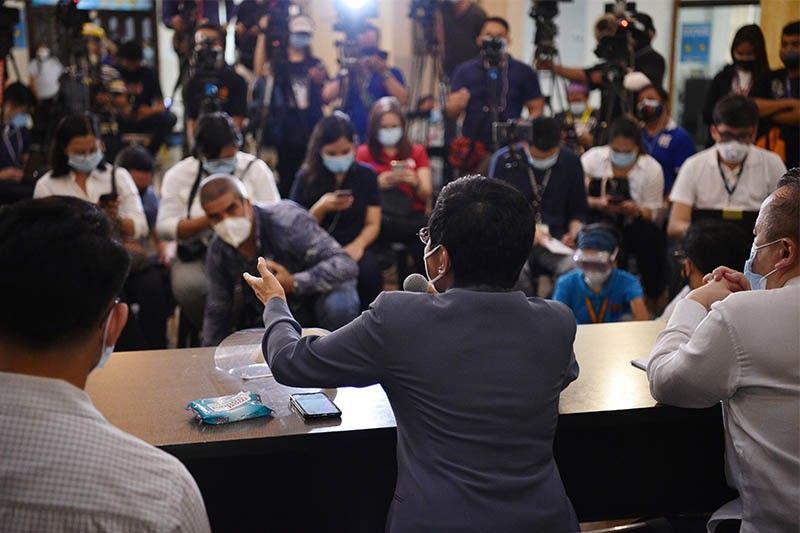Calls to decriminalize libel resurface as Rappler journalists face yet another libel suit

MANILA, Philippines — Journalists renewed their call for the decriminalization of libel, arguing that the country’s defamation laws have been used to intimidate journalists, after a Manila court ordered the arrest of Rappler CEO Maria Ressa and Rappler reporter Rambo Talabong for cyber libel.
The National Union of Journalists of the Philippines (NUJP) said in a statement that the fresh cyber libel case against Rappler journalists — the third against Ressa and the first against a current Rappler staff — shows the “long overdue” need to decriminalize libel.
“Our laws continue to be used more often than not to intimidate journalists than to seek redress,” the NUJP said.
The union called on Congress to make the decriminalization of libel and cyber libel a priority, which it described as “commonly used weapons against independent journalism.”
The #HoldtheLine Coalition of more than 80 international groups also called for the scrapping of criminal libel in the Philippines to “let the news media get back to its job of reporting on the global health pandemic and other issues of critical public interest.”
First option?
The cyber libel case stems from a story Talabong penned which details an alleged scheme involving Ariel Pineda, a program director at the De La Salle – College of Saint Benilde, who supposedly passed thesis students for the price of P20,000.
Pineda has not confirmed or denied the accusation, despite Talabong saying in the story that Rappler tried getting the college professor’s side.
“That this detail, which indicates due diligence and a conscious effort to be as fair as possible, appears to have been ignored is disturbing,” the NUJP said.
Lawyer Theodore Te, who represents Ressa and Talabong in the case, said it is “disturbing” as it appears that suing for cyber libel has become the first option when there is disagreement on reporting.
“Perhaps Congress should consider whether it is high time to decriminalize libel and cyberlibel,” Te said in a statement.
Violation of international rights covenant
The NUJP has counted at least 28 libel or cyber libel cases against journalists since mid-2016, with a number of them having been filed by politicians and government officials.
In 2012, the United Nations Committee on Human Rights declared that the continued criminalization of libel in the Philippines violated the country’s obligations under the International Covenant on Civil and Political Rights.
Journalists in the country have long called to decriminalize libel, along with the graver cyber libel offense stipulated in the Cybercrime Prevention Act of 2012.
The Philippine Center for Investigative Journalism in 2014 had warned of the "chilling effect" it may have on free expression, while media watchdog Center for Media Freedom and Responsibility said it "throws such a wide net it penalizes even legitimate expressions of opinion online."
Ressa, whose news organization has earned the ire of President Rodrigo Duterte for its critical reporting into his administration’s war on drugs and alleged corruption, has been convicted of cyber libel along with ex-Rappler researcher Reynaldo Santos Jr. in June 2020 over a story linking businessman Wilfredo Keng to human and drug trafficking.
The story was published before the enactment of the Cybercrime Prevention Act, but the court ruled that the law still applied as it agreed with state prosecutors who argued that Rappler republished the article after the law became effective. Rappler said the story was merely edited for a typographical error in 2014.
“The Department of Justice literally stretched the law to ensure they could be prosecuted for an offense committed even before it legally existed,” the NUJP said.
- Latest
- Trending




























